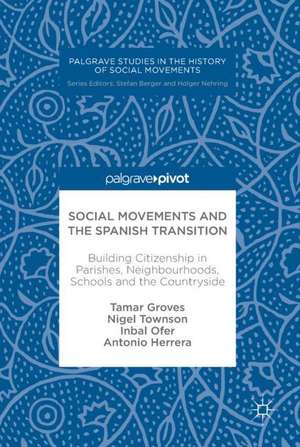Social Movements and the Spanish Transition: Building Citizenship in Parishes, Neighbourhoods, Schools and the Countryside: Palgrave Studies in the History of Social Movements
Autor Tamar Groves, Nigel Townson, Inbal Ofer, Antonio Herreraen Limba Engleză Hardback – 7 sep 2017
| Toate formatele și edițiile | Preț | Express |
|---|---|---|
| Paperback (1) | 349.05 lei 38-44 zile | |
| Springer International Publishing – 11 aug 2018 | 349.05 lei 38-44 zile | |
| Hardback (1) | 418.45 lei 43-57 zile | |
| Springer International Publishing – 7 sep 2017 | 418.45 lei 43-57 zile |
Din seria Palgrave Studies in the History of Social Movements
- 18%
 Preț: 783.98 lei
Preț: 783.98 lei - 9%
 Preț: 833.81 lei
Preț: 833.81 lei -
 Preț: 425.20 lei
Preț: 425.20 lei -
 Preț: 385.08 lei
Preț: 385.08 lei - 18%
 Preț: 790.28 lei
Preț: 790.28 lei - 15%
 Preț: 583.93 lei
Preț: 583.93 lei - 18%
 Preț: 737.12 lei
Preț: 737.12 lei - 15%
 Preț: 698.30 lei
Preț: 698.30 lei -
 Preț: 414.80 lei
Preț: 414.80 lei -
 Preț: 385.25 lei
Preț: 385.25 lei - 15%
 Preț: 590.63 lei
Preț: 590.63 lei - 18%
 Preț: 896.84 lei
Preț: 896.84 lei - 18%
 Preț: 735.38 lei
Preț: 735.38 lei - 18%
 Preț: 782.87 lei
Preț: 782.87 lei -
 Preț: 384.48 lei
Preț: 384.48 lei -
 Preț: 384.09 lei
Preț: 384.09 lei - 18%
 Preț: 953.03 lei
Preț: 953.03 lei - 18%
 Preț: 731.28 lei
Preț: 731.28 lei -
 Preț: 483.70 lei
Preț: 483.70 lei - 18%
 Preț: 786.04 lei
Preț: 786.04 lei -
 Preț: 451.10 lei
Preț: 451.10 lei - 15%
 Preț: 592.12 lei
Preț: 592.12 lei - 15%
 Preț: 580.49 lei
Preț: 580.49 lei - 18%
 Preț: 791.57 lei
Preț: 791.57 lei - 15%
 Preț: 710.42 lei
Preț: 710.42 lei - 18%
 Preț: 736.32 lei
Preț: 736.32 lei -
 Preț: 484.69 lei
Preț: 484.69 lei - 15%
 Preț: 705.34 lei
Preț: 705.34 lei - 18%
 Preț: 729.36 lei
Preț: 729.36 lei -
 Preț: 384.86 lei
Preț: 384.86 lei - 18%
 Preț: 954.77 lei
Preț: 954.77 lei - 15%
 Preț: 712.87 lei
Preț: 712.87 lei -
 Preț: 455.71 lei
Preț: 455.71 lei - 9%
 Preț: 700.29 lei
Preț: 700.29 lei -
 Preț: 391.61 lei
Preț: 391.61 lei
Preț: 418.45 lei
Nou
Puncte Express: 628
Preț estimativ în valută:
80.07€ • 83.81$ • 66.64£
80.07€ • 83.81$ • 66.64£
Carte tipărită la comandă
Livrare economică 31 martie-14 aprilie
Preluare comenzi: 021 569.72.76
Specificații
ISBN-13: 9783319618357
ISBN-10: 3319618350
Pagini: 124
Ilustrații: XVII, 144 p.
Dimensiuni: 148 x 210 mm
Greutate: 0.35 kg
Ediția:1st ed. 2017
Editura: Springer International Publishing
Colecția Palgrave Macmillan
Seria Palgrave Studies in the History of Social Movements
Locul publicării:Cham, Switzerland
ISBN-10: 3319618350
Pagini: 124
Ilustrații: XVII, 144 p.
Dimensiuni: 148 x 210 mm
Greutate: 0.35 kg
Ediția:1st ed. 2017
Editura: Springer International Publishing
Colecția Palgrave Macmillan
Seria Palgrave Studies in the History of Social Movements
Locul publicării:Cham, Switzerland
Cuprins
Chapter 1: Introduction.- Chapter 2: Catholicism and Citizenship under the Franco Dictatorship.- Chapter 3: The Right to the City and the Right to the State: Neighbourhood Associations and the Negotiation of Citizenship.- Chapter 4: Professional Citizenship in the Workplace: Teachers’ Civic Initiatives.- Chapter 5: Citizenship and democracy in the Spanish countryside.- Chapter 6: Citizen building during the Spanish Transition to Democracy: Between the Spanish Debate and the Social Movements Debate.
Recenzii
“Julia Preece’s book is an exciting and very important book for the community engagement field—not just in South Africa and the global south where many of her case studies are located, but for the field more broadly too. … this is an excellent book and an essential read for SL and CE practitioners and students in both the global South and North.” (Janice McMillan, International Journal of Lifelong Education, Vol. 37 (6), 2018)
Notă biografică
Tamar Groves is Senior Lecturer at Extremadura University, Spain.
Nigel Townson is Senior Lecturer at the Complutense University of Madrid, Spain.
Inbal Ofer is Senior Lecturer in Modern European History at the Open University of Israel, Israel.
Antonio Herrera is Associate Professor in Contemporary History at Universidad Pablo de Olavide, Seville, Spain.
Nigel Townson is Senior Lecturer at the Complutense University of Madrid, Spain.
Inbal Ofer is Senior Lecturer in Modern European History at the Open University of Israel, Israel.
Antonio Herrera is Associate Professor in Contemporary History at Universidad Pablo de Olavide, Seville, Spain.
Textul de pe ultima copertă
This book explores the role of popular forms of social mobilization during Spain's process of transition to democracy. It focuses on the nature of citizenship that was forged during the period of conflict and mobilisation that characterised Spain from the late 1950s until the late 1980s. It offers a two-pronged exploration of social movements at the time. On the one hand, it provides a detailed analysis of four very different cases of social mobilisation: among Catholics, residents, farmers and teachers. It discerns processes of organisation, repertoires of action, collective meaning, and interactions with communities and local political actors. On the other hand, it reflects on how the fight over specific issues and the use of similar tactics generated shared interpretations of what it meant to be a citizen in a democracy.
Caracteristici
Focuses on four distinct manifestations of social mobilization during 1970s Spain to show how these diverse groups were united in their aims to effect political change Looks outward to the global cycle of mobilization which started in the late 1960s to contextualize the Spanish case Challenges traditional interpretations of the Spanish transition to democracy which attribute its success to top-down political engineering, instead emphasizing the importance of wider socio-economic processes and social movements Includes supplementary material: sn.pub/extras
